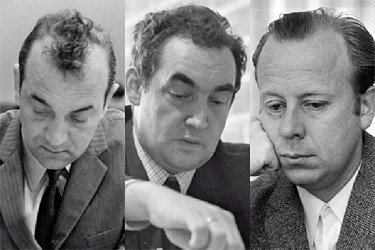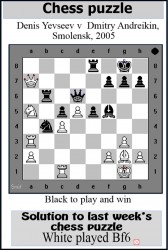Why is chess important? This question has been de-bated over time. The answers are varied. Every chess player has an explanation. A popular line of reasoning is that chess has embedded itself into our culture and that is reason enough to indulge in the royal game. Another view is that there are an estimated 600 million regular chess players worldwide, quoting from a survey which was commissioned by the Fédération Internationale des Échecs, or FIDE (pronounced Fee-day), the world chess organization. However, a former chess prodigy, and now an astute politician, expounded his views in relation to the origins of chess. He contends that chess itself comes from a higher plane, either God or outer space. It certainly is not of this world.
The game is very old. Historians say chess has its origins in India, going way back to the year 6ad. A story is told of a powerful king who wanted to lessen his wife’s boredom at the palace and therefore instructed his courtesans to develop a social board game.
The game should make provision for a stalemate factor. Sacrifices should also be a weapon to influence a decision in the game, in addition to other creative allowances. And so the sages of the king created chess. This and other stories abound, and naturally, the embellishments travel through time with them during the game’s 1500 year history. In relation to the stories, no one knows for sure if any have substance.

But when I perceived him giggling with his colleagues away from the playing table, I felt that something was up. I felt that he was conveying a hilarious message to myself that he was smarter than I was. But he made a simple error. He telegraphed his intentions beforehand. I met him in Montreal and we discussed the game. And so these are the kinds of images which chess creates. The game forces one to think.

The internet has transformed the game in a direct and alluring way. Information geared to improving one’s game is now readily available on the internet. For years, the emergence of new grandmasters was severely limited, that is, until the internet was born. Nowadays, young men and women are becoming masters, international masters and grandmasters more frequently. In addition, the internet has made it possible to identify a chess opponent anywhere in the world. At a moment’s notice, I can confront an opponent, say in the Seychelles in the South Pacific, at ten in the evening. I would imagine the internet has converted China into a powerhouse chess nation. At the 2014 Tromso Olympiad, China won the coveted gold medal in the Men’s category beating Russia into fourth place.
Chess computers originally developed to test the bounds of artificial intelligence, now play better than grandmasters. Recently, Hikaru Nakamura, a former US chess champ, played a match with Stockfish, a chess computer rated at 3000 points. Magnus Carlsen, the world champion and highest ranked player worldwide, has 2875 rating points. Stockfish defeated the human although Nakamura was ably assisted by another computer, Rybka. But in one of his games, in his four game match, playing without the assistance of Rybka, Nakamura drew with Stockfish. There may be some hope for humankind after all.
Chess has been used as a proxy for intelligence and complexity. Personally, my life is richer because of knowledge of the game. It’s a pity that so many people locally, have never had the opportunity of learning this ancient game.
It makes us poorer as a society in terms of creativity. I continue to advocate that chess should be taught in schools in a structured manner. It is not a diversion. Perhaps we can begin the process of its introduction into a sprinkling of pilot public schools in each of the ten regions. A number of countries have seen the value of chess and have introduced it into their schools, like England and India for example. Ideas, Mr Watson! Ideas!
Chess games
The following games were played at the Sinquefield Cup chess tournament in St Louis, USA. The tournament ended on Sunday with the world’s number two chess player, Italy’s Fabiano Caruana, emerging victorious ahead of world champion Magnus Carlsen.
Vachier-Lagrave v Carlsen
White: Maxime Vachier-Lagrave
Black: Magnus Carlsen
1.e4 e5 2.Nf3 Nc6 3.d4 exd4 4.Nxd4 Bc5 5.Nb3 Bb6 6.Nc3 Nf6 7.Qe2 a5 8.e5 O-O 9.exf6 a4 10.Nd5 Re8 11.Be3 axb3 12.Qg4 g6 13.Bc4 Nb4 14.Nxb4 d5 15.Qf4 dxc4 16.O-O bxc2 17.Nd5 Re6 18.Qxc4 Bxe3 19.fxe3 b5 20.Qc5 Bb7 21.Ne7+ Kh8 22.Qxc2 Raa6 23.Rac1 Rxf6 24.Rxf6 Rxf6 25.Qxc7 Qd2 26.Qb8+ Kg7 27.Qg8+ Kh6 28.Qf8+ Kh5 29.Rc5+ g5 30.Rxg5+ Kxg5 31.Qg7+ Rg6 32.Qe5+ f5 33.h4+ Kh5 34.Qxf5+ Kh6 35.Qf8+ Kh5 36.Qf5+ Kh6 37.Qf8+ Kh5 38.Qf5+ 1/2-1/2.
Caruana v Carlsen
White: Fabiano Caruana
Black: Magnus Carlsen
1.e4 c5 2.Nf3 Nc6 3.d4 cxd4 4.Nxd4 g6 5.c4 Nf6 6.Nc3 d6 7.f3 Nxd4 8.Qxd4 Bg7 9.Be3 O-O 10.Qd2 a5 11.b3 a4 12.b4 Be6 13.Rc1 Nd7 14.Be2 Nb6 15.Nb5 a3 16.Nd4 Bd7 17.h4 h5 18.g4 hxg4 19.fxg4 e5 20.Nb3 Bc6 21.Bf3 f5 22.gxf5 gxf5 23.Na5 f4 24.Bf2 Na4 25.Nxc6 bxc6 26.O-O c5 27.b5 Bf6 28.Kh1 Nb6 29.Rcd1 Kh8 30.Qxd6 Qxd6 31.Rxd6 Nxc4 32.Rd5 Ne3 33.Bxe3 fxe3 34.Be2 Bxh4 35.Rf5 Rxf5 36.exf5 Rd8 37.Rxd8+ Bxd8 38.Kg2 Kg7 39.Kf3 Kf6 40.Ke4 c4 41.Bxc4 Bb6 42.Bd3 1/2-1/2.
Aronian v Carlsen
White: Levon Aronian
Black: Magnus Carlsen
1. d4 Nf6 2. Nf3 b6 3. g3 Bb7 4. c4 g6 5. Bg2 Bg7 6. O-O O-O 7. Re1 e6 8. Nc3 Ne4 9. Nxe4 Bxe4 10. Bg5 Qe8 11. Qd2 d6 12. Bh6 Nd7 13. Rac1 Qe7 14. Bxg7 Kxg7 15. Bh3 Nf6 16. Nh4 Bb7 17. f3 c5 18. e4 cxd4 19. Qxd4 Rfd8 20. Ng2 Qc7 21. Ne3 Qc5 22. Qc3 a5 23. Red1 h5 24. Rd3 b5 25. b3 bxc4 26. bxc4 Bc6 27. Rcd1 Rd7 28. Bg2 Rb8 29. Qd4 Qe5 30. f4 Qxd4 31. Rxd4 Rc7 32. R1d2 Ne8 33. Kf2 Kf8 34. c5 dxc5 35. Rc4 Bb5 36. Rc3 c4 37. e5 Rc5 38. Nc2 Nc7 39. Nd4 Nd5 40. Bxd5 Rxd5 41. Nf3 Rc5 42. Rb2 Rd8 43. Nd2 Bc6 44. Nb3 Rb8 45. Rcc2 c3 46. Rb1 Rcb5 47. Rxc3 Bd5 48. Rbc1 Bxb3 49. Rxb3 Rxb3 50. axb3 Rxb3 51. Rc8+ Ke7 52. Kg2 a4 53. Kh3 g5 54. fxg5 Rb4 55. Ra8 Rg4 56. Ra7+ Kf8 57. g6 fxg6 58. Kg2 g5 59. Kf3 Rb4 60. Ke3 Ke8 61. Kd3 h4 62. Kc3 hxg3 63. hxg3 Rg4 64. Kd3 a3 65. Ke3 Rxg3+ 66. Kd4 g4 67. Ra8+ Kd7 68. Kc5 Rd3 69. Kc4 Rf3 70. Kc5 g3 0-1.





